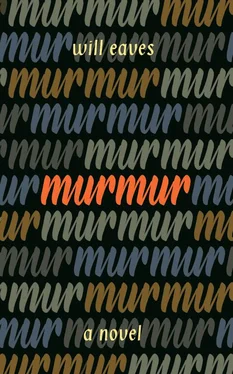—A. M. Turing, “On Computable Numbers, with an Application to the
Entscheidungsproblem ” (1936)
Acoustic dark: voices and squeaks, the slide and shunt of forms. The darkness has a leathern softness, lit by brass flashes. The brightness of a buckle or the ring of metal round an inkwell permits me the briefest of glimpses of faces, shoes, socks, ties, and desks—before I’m on the move again, on the back wall, rising through polished wood. Wainscoting. Painted initials, glorious lists scroll down before me. I’m behind the sad letters (Atkins, B. S., Atkins, J. T.), scanning from right to left until a sort of dawn breaks and I’m clear.
A boy with parted hair and brown perceptive eyes looks through me, through the pane: Alec Pryor, the name just visible in an upturned collar. Beside him sits a paler, neater blond boy, C. C. Molyneaux (according to a red notebook), fully absorbed in the lesson, unlike his friend, who yawns and mists the glass so that my view of both boys is obscured. When the mist clears, Pryor stares with a new intensity. He whispers, “Absolute…” and presses with his dirty shoe on the much cleaner toe of C.C.M. Turns back to face the front seconds before the master stops chalking equations on the board.
“Hindsight,” the master’s high and drifting voice declares, “may have a scientific use. Physical measurements that we make now, of particles in flight, affect the story we can tell about the past.”
The thirty lives in this cold room, seen from some distant vantage point, are like the hopeful lanterns of a struggling ferry.
“That is the world of quantum measurement advanced by Mr. Schrödinger. But note: the past itself is still secure. Pryor, I saw you roll your eyes. I heard you say, ‘Nonsense.’ These marks of insolence are fixed. While I may change the story that I tell of them, should any mitigating information come to light, I may not change the marks themselves. On a related matter, we may not go back. We recollect our own past and form impressions of history in general. But to revisit any part of it is out of the question, unless we are unhinged and can mistake the fact of being able to imagine Agincourt for Agincourt itself.”
“Sir.” The blond boy raises his hand only to lower it again. He has a way of interrupting and then hesitating that wrong-foots authority. Masters forget to chide or punish him. They like him. He has interesting things to say.
“Molyneaux.”
“What if you could really go there, sir, the past, I mean? Observing, not acting. But be there, knowing it, much more than if you were just looking back?”
“Charming hypothesis.” The master smiles. The other boys begin to yawn or look bemused. “Alas, here we intrude upon the realm of fantasy.”
“You’d need a machine,” Pryor says, his shoe pressing on Molyneaux’s.
“As I was saying, Pryor, here we part company with the real. If you could build such a machine, then Mr. Wells and Mr. Hilton, not to mention Mr. Wilfrid Ashley of the Ministry of Transport, would be breaking down your door. Now—”
“But, sir,” Pryor objects. He’s come alive and speaks quickly. “It only need be hypothetical. We only need to know what sort of machine it would be, for now. To have an abstract idea.”
He laughs softly. One dissipating “ha!”, the wheeze of a harmonica.
Seated, holding his chalk, the master says, “Go on.” It isn’t what the boy says that matters. It is the boy himself, his shyness overcompensated for by chatter, dares, and intellect.
Pryor explains. A group of individuals have an idea, work hard, give way to others, who refine the problem in a different way until it’s solved or, probably, transformed. The abstraction evolves until it can be made. It takes a certain quantity of time. “It’s just an algorithm, sir. Like anything. Like any set of instructions. A time machine to build another time machine!
“And then, as well, of course”—it’s strange the way his nerves produce a cry, as though he were wailing “listen to me”—“you don’t have to build anything to time-travel. If you are here, in Wargrave, and I’m far away—”
“How far?” says someone else.
“Oh, I don’t know. Ten billion—”
“Ten billion!”
“—light-years. And I am there, and I walk just a few steps on, away from you… well, doing that, I turn into your past. My ‘now’ is long before you’re even born. Or if I walk toward the Earth, my now is your future, in which a time machine exists. In which we use them—well, sir, all the time. Quite commonly.”
Master and Molyneaux and thirty other pairs of eyes bend light toward the figure by the window, with its face half-cut by shadow and half-blinking in the sun. It is a humorous face, eager. He looks so young, dark hair and brows, heavy as cornices, sharpened by sudden growth, the jacket on broad shoulders waiting to be filled. His lips are parted wide enough for me to see the hint of supernatural incision—small and backward-sloping teeth.
“I’m very taken with that idea,” says Pryor, when the bell goes and the boys rise, muttering. “Of yours ,” he adds, his eyes still bright and anxiously moving, aware of Molyneaux’s silence. “Very taken indeed. It’s like telepathy. The silent understanding. And so Roman, the two-headed god—”
“Pryor.”
“Or like backstroke, you know. Facing backward, going forward—in a different element, and one you can’t fully resist, so that you’re never out of the water. The thing I didn’t like was Stallbrook’s vagueness. ‘Particles in flight.’ What does that mean? They’re not part of some other medium. He doesn’t see, does he?”
“Pryor. Just—”
“What?”
“Be quiet.”
The boy is skewered. We’re in a corridor where I can hear more than I see. Swaddled by wood, I sense his smiling injury. And Molyneaux, from whom a shape extends to merge with his friend’s darker mass, relents. “You’re a good sort, Pryor. We talk a lot. You know so much about, well… iodates, for one thing. And the whole of Stinks.” The dark mass shifts, emits an aspirated ha! “Only, you oughtn’t make the Colonel look small. He’s on our side, and we’ve a lot to thank him for. And what”—his voice drops—“was that business with the shoe about? No more of that. It’s… excessive. There’s a good chap.”
The pale form pulls free of its companion and leaves. Pryor walks slowly in the other direction, toward the common room and a pier glass.
Now, from the mirror, I can see him properly again. His chin-raised profile glides unreadably. He looks stoic. Around the corner, in the cloistered gallery, I lose clear sight of him. The wood absorbs a little heat. His thermal shape alters, its uprightness a shade reduced, as though his head were bowed. He seems to hug his books and several ha! s escape, ash-white, embered, into the air.
More bells, more boys, blurred faces, voices, and a tide of youth.
Pryor turns round and runs back down the corridor the way he came, his head held high. He’s fast. I see him intermittently, as sharply as a passenger at night sees his reflection in the mirror of a train window. He comes and goes: field flashes of presence. The hair has fallen free, he scarcely seems to breathe, his books pinned to his chest, the right arm slicing air. Flushed now, he catches Molyneaux beside a pair of double doors. Through their portholes he sees a class changing, hanging up clothes on hooks, glockenspiel ribs, hands clasping cuffs, an air of general alarm. There’s tiled noise. Others barge past. I can’t hear what Pryor has said. His voice swings back and forth. His hand is briefly on his friend’s shoulder but soon withdrawn, and now he holds the door.
Читать дальше












